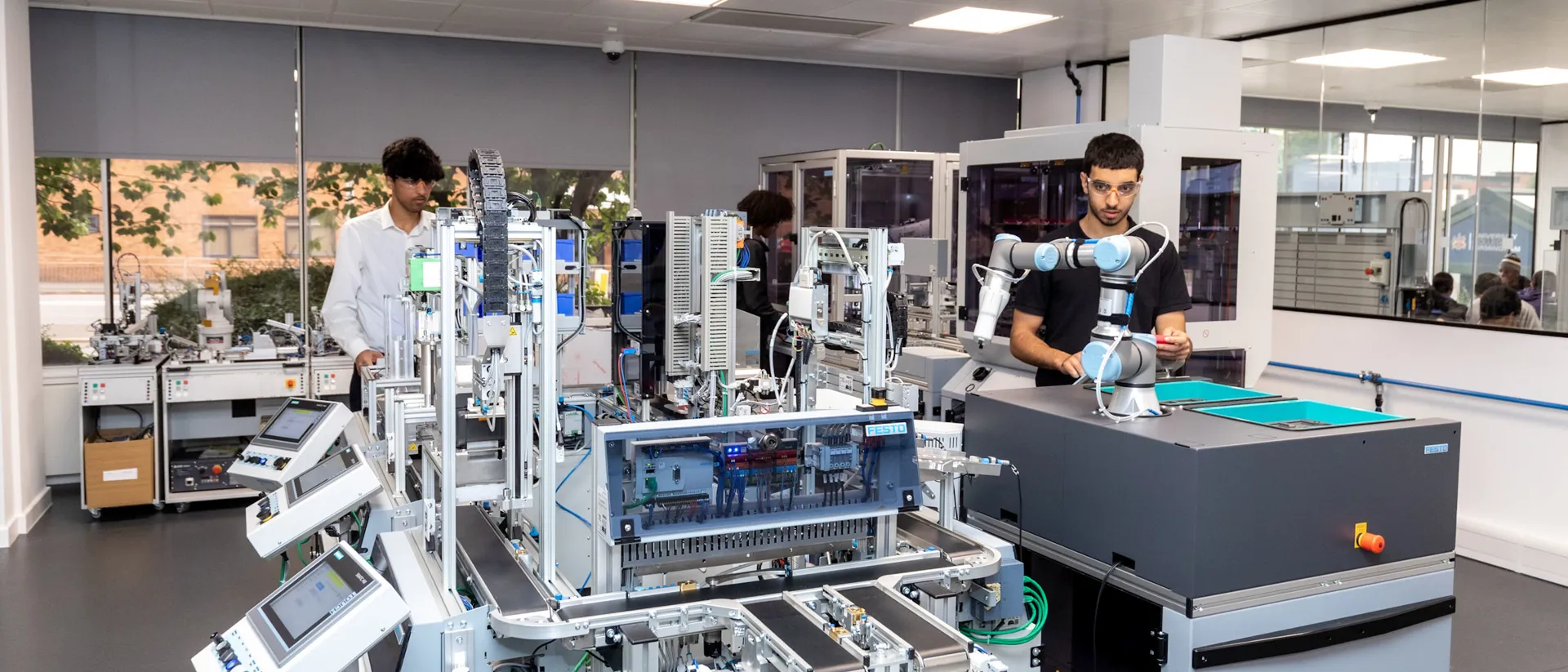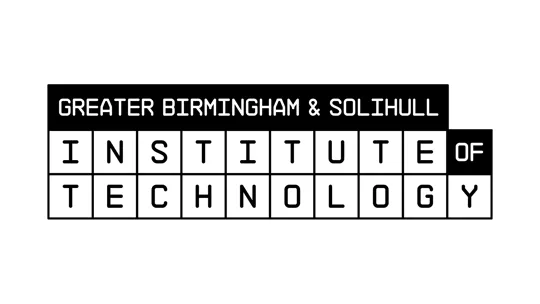
ELECTROMECHANICAL ENGINEERING
BEng (Hons)
Accredited by University College Birmingham (Sep 2026 entry)
- University
- Undergraduate
- Courses
- Electromechanical Engineering BEng
Award
BEng
Course Level
Undergraduate
Duration
3 years FT/4.5 years PT
Entry
September, February
Fees
View fees
The best of both worlds - one degree, two disciplines
Our Electromechanical Engineering BEng (Hons) develops the practical skills and technical knowledge needed for modern engineering careers. You’ll study in Industry 4.0 facilities, using industry-standard software and hardware to design and maintain electromechanical systems for sectors such as automation, robotics and renewable energy.
Built around practical learning: 100% labs and seminars, no lecture theatres.
- Hands-on Industry 4.0 experience where you work with real industrial equipment, programming robots, controllers, PLCs and advanced manufacturing rigs in our engineering facilities.
- Apply simulation software and practical design tools used in professional engineering to build expertise across electrical, mechanical and automation systems.
Study in Birmingham - the city of a thousand trades - with industry all around you.
- Study at the heart of UK industry - Birmingham’s rich manufacturing heritage, once known as the “city of a thousand trades” for its diverse industrial output, means you will be surrounded by engineering, advanced manufacturing and innovation hubs.
- As Britain’s second city with a strong commercial and industrial economy, Birmingham offers engineering students connections to businesses, start-ups and professional networks throughout the region.

Learn using practical facilities

Industry-led teaching

UK’s second-largest city, industry-connected

Excellent engineering career opportunities
£5k Cost of Living Allowance
At University College Birmingham, we believe the cost of living shouldn’t hold you back from achieving your goals. That’s why we’re providing UK full-time undergraduate students starting in February or September 2026 with £5,000 each to support expenses like food, bills, and transport - completely free, with no need to pay it back.

Pay early and save up to £4,500
International students applying for our BA/BSc undergraduate degrees, who meet all our deposit deadlines, can qualify for Early Action Scholarships of £4,500 or £3,500, depending on your course. Simply meet the payment deadlines and we'll do the rest - no application needed. International students can also apply for merit scholarships, worth up to the full amount of the tuition fee.
Our facilities
Engineering students gain hands-on experience of programming robots and controllers in our state-of-the-art industrial manufacturing cell facility, plus you will use all our modern laboratories for practical work in electrical power, electronics and control, fluid mechanics, mechanical principles and materials testing.
- Training rigs
- Production line technology
- Industry 4.0 rigs
- Process manufacturing training equipment
- Hydraulics
- Pneumatics
- Renewable energy simulators
- Control engineering rigs
- Cyber-physical system
- Mechatronics automation
- PLCs
- Fluid dynamics software
- MATLAB design software
- Enhanced IT facilities

GBSIoT facilities
Our students gain access to the GBSIoT Hub — a state-of-the-art facility in central Birmingham, including Europe’s largest Cyber Physical Manufacturing Rig, hybrid classrooms and hot-desk spaces.
"As technology evolves, the boundaries between the different engineering disciplines are merging. As a result,a curriculum which bridges this divide gives engineers a broad technical toolset from which to address the industrial and engineering challenges of the future.
At a time where technology is evolving more rapidly than ever before, dual-skilled engineers are well-positioned to maximise their potential and maximise these opportunities."
Steve Jones Siemens - Connected Curriculum Lead
Course breakdown
- Year 1
- Year 2
- Year 3
Year 1
Engineering Mathematics
A thorough understanding of mathematical principles is essential in engineering. This module will ensure that you will have the required mathematical tools to both complete the remaining modules within the BEng programme. The module will also provide the key mathematical principles that will help with your future engineering career. The module is delivered using a mix of lectures, self-guided study and tutorials. The module will cover matrix methods, probability and statistics, vectors and sinusoidal functions, complex numbers, calculus, and numerical methods.
Mechanical Principles
A thorough knowledge of mechanical principles is crucial in allowing engineers to design and manufacture the products that are all around us. The knowledge and application of these mechanical principles is still the essential underpinning science of all machines in use today or being developed into the latest technology. Modern engineering systems and products rely upon static and dynamic principles to make them work. Even systems that appear to be entirely electronic have a physical presence governed by the principles of statics. In this module you will be introduced to the essential mechanical principles associated with engineering applications such as: Behavioural characteristics of static, dynamic, and oscillating engineering systems including shear forces, bending moments, torsion, linear and angular acceleration, conservation of energy and vibrating systems; and the movement and transfer of energy by considering parameters of mechanical power transmission systems. The module is delivered using a mix of lectures, self-guided study, and tutorials. On successful completion of this module you will be able to explain the underlying principles, requirements, and limitations of mechanical systems.
Electrical Principles
When working in electrical and electronic engineering, the engineer must have a fundamental knowledge of the principles of electrical circuits and the function of the components within. The module introduces these fundamental concepts and principles of electrical circuits used in engineering and you will be able to relate to those circuits and know how these circuits are used in electro-mechanical devices and applications.
Electronics and Logic
The broad field of electronics and logic covers many aspects built around analogue and digital semiconductor devices, which have become the basis of modern electronics. Among the topics included in this module are: An introduction to semiconductor theory and key electronic components, different types of diodes and transistors. voltage regulation, power amplifiers, operational amplifiers, inverting, non-inverting, positive and negative feedback; frequency response and bandwidth. In addition, the fundamental elements of digital circuits, notably different types of logic gates and bistables are introduced. The techniques by which such circuits are designed, simulated, prototyped, analysed, and applied. Including truth tables, Boolean Algebra and Karnaugh maps. The use and application of combinational and sequential logic circuits, basic control principles and applications. On successful completion of this module, you will be able to simulate and determine the operational characteristics of a range of analogue and digital circuits and investigate the types and effects of feedback on their performance.
CAD Design
Computer Aided Design (CAD) is one the most important disciplines in engineering. This module will provide the foundation and practical skills needed to use an industry standard CAD solution to design an electro-mechanical product. You will learn how to create 3D solid models, create and analyse fully working assemblies, electric schematics and 2D orthographic drawings. You will also learn how CAD data is critical to an engineering company and how it forms part of an end-to-end business process where the CAD data forms the virtual prototype. The module is delivered using a mix of lectures, self-guided study, and tutorials.
Software Applications
Software applications play an important role in accelerating innovation in engineering. Through simulation, designs can be optimised, and products can be virtually tested to determine key design parameters such as stress, strain, deflection, and factor of safety. Industry standard programming and numeric computing platform models can also be used to create and analyse models. In this module you will use industry standard 3D design software to develop engineering models and then analyse the products using the basic features of Finite Element Analysis (FEA) and Computational Fluid Dynamics (CFD). You will also use an industry standard programming and numeric computing platforms to create models for further analysis. The overall aim of the module is to introduce the basic concepts of the software applications that are available to assist engineers throughout the product lifecycle. The module is delivered using a mix of lectures, self-guided study, tutorials, and group projects.
Year 2
Systems and Control Principles
This module will provide you with a comprehensive understanding of the principles and techniques used in modern control systems. You will explore the mathematical models that describe dynamic systems, learn about the characteristics of control systems, and understand how to design controllers to regulate system behaviour. Key topics include system representation, stability analysis, control techniques such as PID control, frequency response, and state space analysis. This module involves practical lab sessions for hands-on experience with control systems design and implementation. By the end of this module, you will have the necessary skills to analyse and design control systems, crucial for various engineering disciplines.
Thermofluid Mechanics
When working in Electromechanical Engineering, you will need knowledge of the principles of fluid mechanics and the techniques that are needed to predict the behaviour of fluids in a range of engineering applications. This module will provide you with knowledge of the principles applied to fluid mechanics and how to use techniques that predict, analyse and control the behaviour of fluids in given engineering applications. You will also study thermodynamics and how the Laws of Thermodynamics are applied and analysed by mathematical modelling for a range of thermodynamic systems.
Renewable Energy and Sustainability
If the governments of the world are to tackle the problems of global warming and efficient use of renewable energy, engineers are key in solving them. Everything a professional engineer does affects these areas, as it is they who design, test and manufacture products that use the energy and make a contribution to global warming. A motor vehicle is a prime example. Indeed, the design of a product alone will determine approximately 80% of how that product will contribute to global warming and what happens to it at the end of that product’s lifetime. Energy use is a major contributor to global warming and engineers are pivotal in developing new renewable energy technologies. The Renewable Energy and Sustainability module aims to provide you with a wide understanding of societal pressure and the issues that face businesses and consider this from an engineering perspective. It will provide you with an understanding of the three pillars of sustainability and how business is affected by engineering decisions on the issues of sustainability and energy use, as we move towards a circular economy. The areas studied in this module are: renewable energy use in comparison to the use of fossil fuels, environmental issues; environmental legislation; sustainable engineering and whole life cycle assessment of a product. Emphasis is placed on the general engineering sectors with consideration to the life cycle assessment of a simple product.
Smart Manufacturing
Smart factories utilise smart manufacturing processes which are enabled by the use of modern technologies such as the industrialised Internet of Things (IoT), artificial intelligence (AI), web-based data exchange, cloud computing and closed-loop data analysis. The smart manufacturing facility will utilise machinery and manufacturing systems that are able to exchange data in order to improve manufacturing processes and productivity. In this module, you will learn about the different areas of smart manufacturing and how the smart factory can benefit from using digitised manufacturing systems. You will consider the benefits of using smart manufacturing and the technologies used. There will be links to other modules on this programme, such as Industry 4.0 and the Internet of Things (IoT). You will identify the use of applications, including wireless connection, sensors and data collection. The module will also include the monitoring of the production environment in terms of production processes and the predictive maintenance of equipment. You will identify with the need for machine learning so that production processes are optimised to reduce energy and increase environmental benefits.
Mechatronics Systems
Mechatronic systems are all around us. In our home appliances, in our cars, in our offices and on the factory floor. Mechatronics has been defined by the IEEE as, “The Synergistic integration of mechanical engineering with electronics and intelligent computer control in the design and manufacturing of industrial products and processes.” That is, it includes aspects of diverse disciplines including mechanical, electrical, electronic, computer and control engineering, resulting in one overall integrated system. Leading mechatronics system engineers will thus have skills across all of these different engineering disciplines, and be able to view any solution holistically, and not just a number of individual parts. This module will give you the skills to take a “system level” view of a system and break it down into appropriate mechanical, electrical and software components to allow you to design a system to achieve a given, integrated function
Virtual Engineering and Simulation
Virtual engineering and simulation play an important role in accelerating innovation in engineering. Through simulation, designs can be optimised, and products can be virtually analysed to determine key design parameters such as stress, strain, deflection, and factor of safety. Assemblies can be simulated to analyse motion studies and further optimise the kinematic operation. In this module you will use industry standard 3D design software to develop electro-mechanical products and then analyse the products using Finite Element Analysis (FEA) and Computational Fluid Dynamics (CFD) techniques. You will explore the underlining mathematical models that facilitate FEA and CFD and explore how the use of simulation tools can improve the time to market for products. The overall aim of the module is to introduce the basic theories of FEA and CFD techniques. The module also requires you to work in a group to solve a real-world engineering problem. The module is delivered using a mix of lectures, self-guided study, tutorials, and group projects.
Year 3
Embedded Systems
Embedded systems are all around us. In our home appliances, in our cars, in our offices and on the factory floor. Embedded systems can be thought of as an entire computing system with processor, memory, power, software, and inputs/outputs in one device. Many of them are to be found in your car, each one quite often dedicated to a small specific task, engine management, entertainment, powered seat, air conditioning. Ranging in complexity, capability and price, they are also to be found in your washing machine, or even at the heart of a jet engine! This hands-on module will give you the opportunity to build an embedded system, based around an Arduino-compatible controller. You will design, build, test, document and present an embedded controller reading data from the environment, processing it according to rules you have set, and producing an appropriate output as a result. It will draw heavily on, and further develop, knowledge you have already gained from earlier modules on this programme.
Internet of Things Operation and Control
We take “stand-alone” electronic devices for granted, now. Electronic security systems, domestic boiler control systems, temperature monitors, pacemakers, car engine management systems, the list is endless. But what if those devices could communicate their condition, and even allow for a user to configure them, remotely, via the Internet? A home alarm that the owner can set and check remotely? A boiler that the user could switch off remotely, as they were going to be away for a few days? A Pacemaker that could contact the health service if it detected an anomaly, and allow a remote physician to adjust it accordingly? A car that told your local service centre when it detects a fault? This is the world of The Internet of Things, known as IoT. This module will build directly on your knowledge gained from the Embedded Systems module and take your learning to the next level.
Industry 4.0 Manufacturing
Industry 4.0 provides a digital transformation for modern manufacturing companies on a global scale. It primarily integrates automation and data exchange technologies within the manufacturing industry. This requires the industrial environment to be fully digitalised by connecting engineering development, manufacturing environments and the supply chain to digital information systems and processes. In this module you will integrate the modules studied on this programme, such as Smart Manufacturing and Internet of Things (IoT), and others that involve digital systems within the manufacturing environment. You will be introduced to the principles of Industry 4.0, and the integration of automated systems and the exchange of data in the manufacturing environment so that flexible manufacturing systems are utilised and production optimised. Practical work will require you to develop a web-based application that will enable a device or system to sense, monitor and control operations.
Project Management
In working life, project management will require you to apply the skills needed to run industrial projects. Skills such as time and resource management, team working and communication are all essential for running projects which may be short or long term, or for smaller projects that are managed simultaneously and in parallel. As an Engineer, you will need these skills as they are essential to the success of any engineering career. The module is practically based using case studies. You will produce a portfolio of work, participating in group work and by producing individual work. You will apply the skills and knowledge required for the running of a successful project. You will acquire knowledge of the theory and practice of sustainable Project Management, you will apply the principles working from a project brief, making decisions, managing risks, using control techniques, management techniques, and the monitoring and reviewing of projects in engineering applications that are designed to challenge you.
Independent Project
The engineering independent project provides an opportunity for you to work independently and investigate a topic in electro-mechanical engineering. It allows you to carry out a detailed and in-depth study of a topic within your own field of interest. The project will enable you to consolidate learning within other areas of your degree programme and strengthen them through further independent study. The engineering Independent Project is a module where you will carry out a detailed study and demonstrate your ability to research and critically review literature. You will further analyse a problem within your area of engineering interest and reflect on the project findings. These are essential skills required to gain employment within the engineering sector. Your project will be presented in a portfolio format with detailed documentation to evidence project planning for the initial topic and a final project report which details the concept and work undertaken in the project outcomes.
The modules listed above for this course are regularly reviewed to ensure they are up to date and informed by industry as well as the latest teaching methods. On occasion, we may need to make unexpected changes to modules – if this occurs, we will contact all offer holders as soon as possible.
Entry requirements
Entry requirements
88 UCAS points –
A-levels: CCD (Engineering, Physics, maths ideally, but not mandatory),
BTEC: MMM (Including further maths unit),
T-level: Pass (core component grade C).
GCSE/IGCSE: Maths (9–4/A*–C) or Functional Skills Level 2.
Other Level 3 qualifications are also welcome.
EU/International Students.
For entry requirements for EU and international students, please visit the Country Specific Information page.
Key information
Teaching and assessment
Note
- Accredited by the University of Warwick (Feb 2026 entry)
- Accredited by University College Birmingham (Sep 2026 entry)
Teaching
A wide variety of teaching methods will be used to ensure you gain the appropriate skills and knowledge, including lectures, practical sessions, workshops, tutorials and group study sessions. Face-to-face classes will be combined with practical research activities in our state-of-the-art engineering facilities, while you will also conduct independent and online learning.
Assessment
Assessment occurs through a combination of assignments, projects and tests/exams, with a focus on the holistic development of practical, interpersonal and higher-level skills. Many modules will require a practical demonstration of skills, while others will require you to carry out your own research and analysis, working independently or as part of a team. Our assessments will focus on developing the skills required by a professional engineer – designing and demonstrating a product, delivering presentations and technical report-writing, aimed at technical and non-technical audiences to broaden your range of skills.
You will also need to commit around 20 hours per week for individual study time.
Estimated breakdown of assessment for this course:
- Coursework – 70%
- Practical assessment – 25%
- Written examinations – 5%
Our teaching and assessment is underpinned by our Learning and Teaching Strategy 2025-2030.
Additional qualifications and training
It is recommended that students on this course join the Institute of Engineering and Technology (IET) as student members, offering benefits including workshops, short courses and webinars as well as alignment with professional expectations. The IET Birmingham base is also located just a short walk from our campus buildings.
Student membership of the IET costs approximately £20 per year – for more details, visit the IET website.
Timetable
We understand that you need to balance study with work, so wherever possible your lessons will be timetabled into 2-3 days a week for full-time and one day a week for part-time study.
Tuition fees for home students
If you are a home student enrolling on an Electromechanical Engineering BEng course at University College Birmingham, the 2024/2025 academic year tuition fee for full-time study is £9,250. In 2025/2026, the full-time fee will be £9,535 per year.
Electromechanical Engineering BEng is a 4.5-year programme when studied part-time. The tuition fee for a full year of part-time study (years 1-4) is £6,165, and for half a year (year 5), the fee is £3,090.
Part-time study tuition fees over 4.5 years:
Year 1: £6,165
Year 2: £6,165
Year 3: £6,165
Year 4: £6,165
Year 5 (half year): £3,090
Tuition fees for international students
If you are an international student (or have been fee assessed as an international fee payer) and are enrolling on a full-time [Band 3] bachelor's degree course in 2025/2026, the fee for the academic year will be £19,750. If you complete a placement year, there will be an administration fee of £500 for a full year or £250 for a half-year placement.
Uniform and kit costs
This course requires equipment (e.g. safety boots, overalls) costing approximately £50, depending on the items you purchase. (Prices are subject to change each year – you will not require any specialist equipment at the start of the course and exact costs and information on how to order required items will be provided to you after enrolment.)
Free £5,000 cost of living allowance
We are committed to supporting students who may be facing financial challenges due to the rise of living costs. If you are a full-time undergraduate student starting your course in February or September 2026, with home fee status and plan to pay your fees using a student loan, you’ll be eligible a £5,000* Cost of Living Allowance.
Further information and frequently asked questions can be found here: £5,000 Cost of Living Allowance
*If you are studying a two-year foundation degree, you will receive £2,000 in instalments each year of your course. If you decide you'd like to top up to a full BA or BSc (Hons) at the end of your foundation degree, you will also be entitled to the £1,000 in the third year.
Kick-Start Scheme
As a new student studying this course full-time, you will receive £300 per year through our Kick-Start Scheme (UK students only, eligibility criteria applies). This scheme will support your studies and future career by contributing to course-related materials, uniform or selected items on campus. You may also qualify for an additional £500 per year.
Find out more about the Kick-Start Scheme here.
How does a free £5k to help fund your studies sound?
At University College Birmingham, we believe the cost of living shouldn’t hold you back. That's why we’re giving all UK full-time undergraduate students starting in September 2025 £5,000 each to support expenses like food, bills, and transport. It's completely free, with no need to pay it back.

This course is delivered in partnership with the Greater Birmingham and Solihull Institute of Technology (GBSIoT).
Accreditations, endorsements and partnerships
University College Birmingham works with a wide range of organisations to ensure you receive the best possible training and qualifications recognised by industry.
Career opportunities
The example roles and salaries below are intended as a guide only.
Mechanical engineer
Average Salary: £32,000
Project engineer
Average salary: £38,000 - £45,000
Process design engineer
Average Salary: £43,000
Process manufacturing engineer
Average Salary: £35,000
Electrical/electronics engineer
Average Salary: £32,000
Product designer
Average Salary: £45,000
Want to take your studies to the next level? Completing the BEng (Hons) degree will enable you to move onto our postgraduate courses such as our Engineering Management MSc/PGDip

Easmay's Story
Electromechanical Engineering at University College Birmingham gave Easmay the chance to turn passion into practical experience. From learning in specialist facilities that reflect real industry to receiving support from approachable lecturers, he is building his skills and confidence. Memorable experiences included a visit to British Airways for Engineering Day, where classroom theory came to life in an aviation setting, and a trip to the GBSIoT, offering access to cutting-edge equipment and expert insight. These opportunities, alongside friendships and academic support, helped shape his ambition and prepare Easmay for a future career in engineering.
Course statistics
BEng (Hons)
Other courses you may like
Engineering Higher National Certificate
If you want to work in engineering and are looking to boost your skills through part-time study, our Higher National Certificate course lets you explore core subjects such as engineering design, maths and science to gain widely-recognised Level 4 qualification alongside your work commitments.
Engineering Management MSc
Want to play a leading role in the technological progress and sustainable future of the engineering sector? This course combines developing your business and managerial skills with building understanding of modern engineering technologies including Industry 4.0, cyber-physical systems, Internet of Things and AI.
Construction Management Higher National Certificate
Our part-time Higher National Certificate course enables you to study for a widely-recognised Level 4 qualification alongside your work commitments. Boost your knowledge in a range of key construction topics including construction technology, surveying, science and materials.
Construction Management BSc (Hons)
Our full-time BSc in Construction Management enables you to build up your knowledge and practical construction skills to become a vital professional in a rapidly growing sector. Crucially, this course focuses firmly on sustainability and future proofing and features an optional, paid placement year.
Construction Project Management MSc
Want to pursue senior roles within the construction industry? Our postgraduate course combines teaching you key aspects of construction management with core technical knowledge in up-to-date topics such as sustainability and modern construction methods, supported by our state-of-the-art Sustainable Construction Centre.
Computer Science BSc (Hons) / FdSc
Open the doors to a future in the modern world of technology. Our Computer Science degree lets you explore the latest cutting-edge topics in the computing industry and will help you become confident with everything from networks and databases to programming and cyber security.
